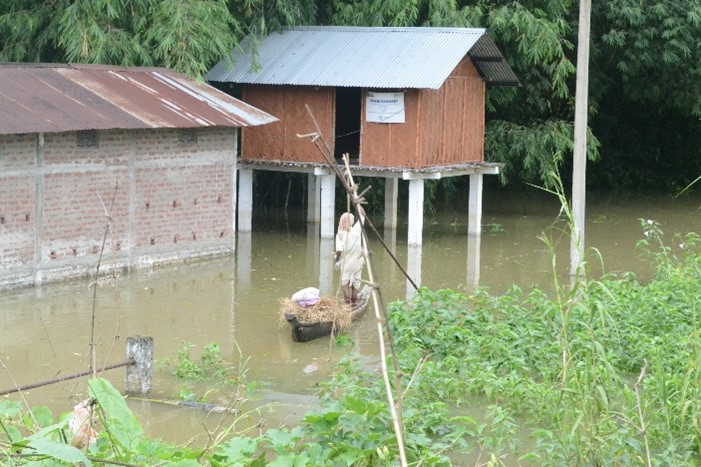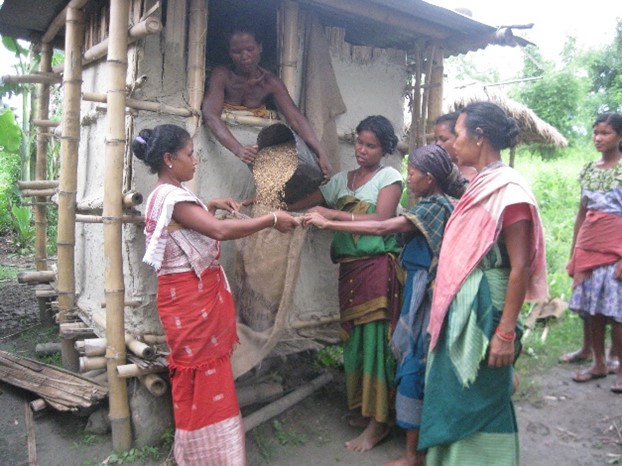Kongali Bhoral

A Community-Based Good Practice for Flood-Resilient Grain Storage in Assam
Introduction: In the flood-prone landscapes of Assam, where annual inundations can pose threats to livelihoods and food security, the Kongali Bhoral emerges as a traditional yet effective community-based good practice. This raised granary, designed to safeguard stored grains during floods, reflects the resourcefulness and resilience of communities in adapting to their challenging environment.


Initiative of North-East Affected Area Development Society (NEADS)
NEADS, a member of India Humanitarian Hub (IHH) has been conceptualising the adoption of ‘Kongali Bhoral’, as one community-based practice for flood-resilient grain storage in the affected communities of the state. This local innovative approach involves elevating traditional granaries above flood levels, protecting essential food supplies during seasonal inundations. By empowering local communities to implement Kongali Bhoral, NEADS had been promoting food security and resilience against recurring floods since the year 2000. This initiative not only preserves grains but also preserves livelihoods, ensuring sustenance for families in challenging times.
Background: Assam’s frequent floods can devastate crops and lead to the loss of stored grains, exposing the food security of affected communities. The Kongali Bhoral, a raised granary, has been a longstanding cultural and practical response to this challenge, providing a means for communities to protect their harvested grains from floodwaters.
Community-Based Good Practices: The Kongali Bhoral is a granary built on elevated platforms or stilts, often constructed using indigenous materials like bamboo and thatch. This community-driven practice draws upon local knowledge and traditions, reflecting a sustainable and adaptive solution to the recurring threat of floods in Assam.
Key Components of Kongali Bhoral:
- Elevated Construction: The granary is built on raised platforms to elevate the stored grains above anticipated flood levels. This elevation protects the grains from direct contact with floodwaters, preventing spoilage and ensuring food security for the community.
- Bamboo and Thatch Materials: Kongali Bhorals are typically constructed using bamboo for the framework and thatch for the walls and roofing. These locally available materials make the granary construction affordable, sustainable, and well-adapted to the flood-prone environment.
- Community Involvement: The construction, maintenance, and management of Kongali Bhorals involve active participation from the community. This collaborative effort not only ensures the granaries are well-suited to local conditions but also establish a sense of collective responsibility.
- Adaptation to Flood Cycles: Kongali Bhorals are designed to withstand the cyclical nature of floods in Assam. The raised structure adapts to the rise and fall of water levels, allowing communities to safeguard their grains during flood events.
Benefits of Kongali Bhoral:
- Preservation of Harvested Grains: The elevated design of Kongali Bhorals protects stored grains from water damage, preventing spoilage and ensuring a stable food supply for the community.
- Community Resilience: By safeguarding essential food resources, Kongali Bhorals contribute to the overall resilience of communities, helping them recover more quickly after flood events.
- Cultural Heritage Preservation: The construction and use of Kongali Bhorals contribute to the preservation of local cultural practices and traditions, passing down valuable knowledge from generation to generation.
- Sustainable Storage Solution: Kongali Bhorals offer a sustainable and eco-friendly solution to the challenge of grain storage in flood-prone areas. The use of locally sourced materials aligns with the principles of environmental sustainability.
Conclusion: The Kongali Bhoral stands as a symbol of community ingenuity and adaptation in the face of annual floods in Assam. This community-based good practice not only ensures the preservation of harvested grains but also fosters a sense of collective responsibility and cultural preservation. As climate change impacts intensify, initiatives like the Kongali Bhoral exemplify the importance of leveraging traditional knowledge and community cooperation to build resilient solutions to the unique challenges faced by flood-prone regions in Assam.
